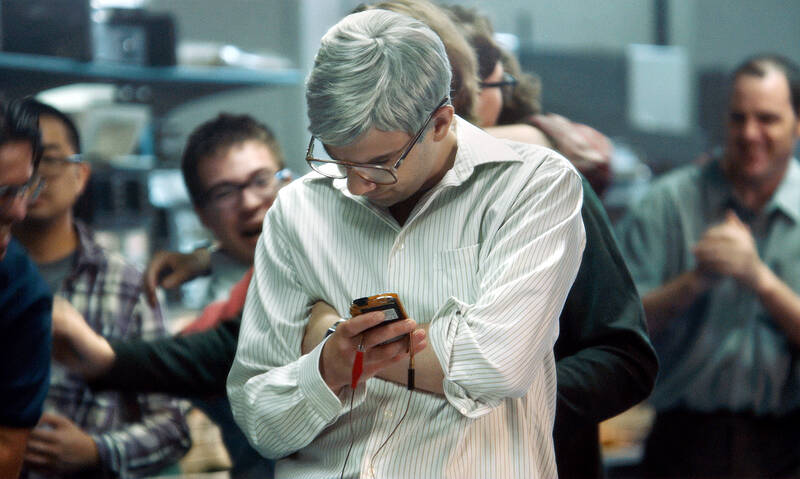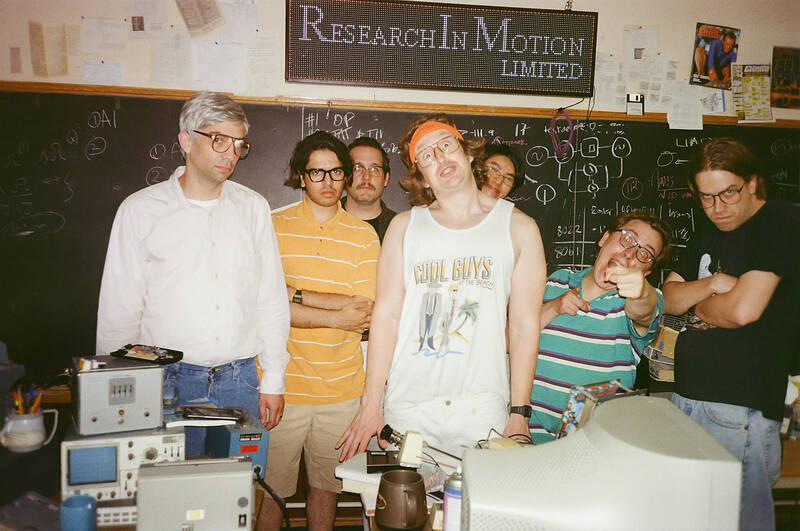Almost everyone knows Steve Jobs’ uncanny vision, relentless drive and technological wizardry hatched the iPhone, a breakthrough that continues to reshape culture 16 years after the late Apple co-founder introduced the device to the world.
But when Jobs unveiled the first iPhone in 2007, another smartphone was the must-have gadget. It was the BlackBerry, a device so addictive that it became known as the “CrackBerry” among tech nerds and power brokers hunched over a tiny keyboard that was best operated with both thumbs clickety-clacking.
Now the BlackBerry is “that phone people had before they bought an iPhone,” a relic so irrelevant that the Canadian company that made it is now valued at US$3 billion — down from US$85 billion at its 2008 peak when it still controlled nearly half of the smartphone market.

Photo: AP
But its legacy is worth remembering — and audiences will get a chance to learn more about its origins in the new film, BlackBerry. It’s the latest movie or TV series to delve into technology’s penchant for groundbreaking innovation, blind ambition, ego clashes and power struggles that turn into morality tales.
That formula has already spawned two Academy Award-nominated movies written by Aaron Sorkin, 2010’s The Social Network delving into Facebook’s founding and 2015’s Steve Jobs, dissecting the Silicon Valley icon. Then came last year’s flurry of TV series examining the scandals enveloping WeWork (WeCrashed), Uber (Super Pumped) and disgraced Theranos CEO Elizabeth Holmes (The Dropout), which won Amanda Seyfried an Emmy for her turn in the starring role.
Unlike any of those biopics, BlackBerry is told as a dark comedy revolving around two amiable but bumbling nerds, Mike Lazaridis and Doug Fregin, who can’t seem to execute their plan to create a “computer in a phone” until they bring in a hard-nosed, foul-mouthed businessman, Jim Balsillie.

Photo: AP
Although BlackBerry is based on a meticulously researched book called The Lost Signal, director and co-star Matt Johnson acknowledged taking more liberties in the movie. Among other changes, Johnson cited shifting some timelines, shaping the company culture through his view of the 1990s and infusing the key characters with “our own personalities and our own ideas.
“But our lawyers wouldn’t let us put anything in the film that was an outright fabrication,” Johnson stressed.
Johnson had to do a lot of guesswork in his role as the enigmatic Fregin, who sold all his stock in BlackBerry’s holding company — then known as Research In Motion, RIM — around the same time Apple released the first iPhone and has kept a low profile ever since.

Photo: AP
“Doug is true cipher, he has never done a taped interview,” said Johnson, which led him to portray Fregin as a “kind of mascot figure who is tying the culture of the office together.”
Ironically, Johnson got a lot of his idea on how to depict Fregin from one of RIM’s early employees, Matthias Wandel, who posted a YouTube video critiquing inaccuracies that he saw in the BlackBerry trailer. Before that, Wandel talked extensively to Johnson about RIM’s history and even provided diaries that he kept while during the BlackBerry’s development.
“I think when he sees the film he is going to be quite charmed by how much of his original notes are in the film,” Johnson said of Wandel. “It’s so funny that he has released that video (because) so much of my character is based on him. I stole everything from that dude. I owe him huge.”
Balsillie, RIM’s co-CEO with Lazaridis, emerges as the film’s most intriguing character. Actor Glenn Howerton (best known for his role in the TV series, It’s Always Sunny In Philadelphia) portrays Balsillie in a way that casts him as both the story’s chief antagonist and protagonist dropping f-bombs in tyrannical temper tantrums at the same time he is making savvy moves that turned the BlackBerry into a cultural sensation.
“It always felt like this was a guy who weirdly felt a little outside of sort of what people would consider to be sort of a titan of technology or business,” Howerton said of Basillie. “I played him as someone who had something to prove at almost all times, that he could play with the big boys.”
Balsillie eventually became entangled in legal problems tied to improper changes to the pricing of stock options — a tactic known as “backdating” that also ensnared Apple’s former general counsel and former chief financial officer in 2007 for their handling of compensation packages awarded Jobs. Both Balsillie and Lazaridis left RIM in 2012.
Now that BlackBerry has faded from the public consciousness, Balsillie seems to be welcoming the renewed attention from the new film even though he quibbled with some aspects of his character during a recent interview with The Canadian Press.
Unlike Lazaridis and Fregin, Balsillie attended a recent showing of the film in Toronto and even walked the red carpet with Johnson and Howerton.
“In many ways, (Jim) was the hero, he was the character who changed for the better (in the film),” Johnson said. “The audience was just with him. It was almost a psychedelic experience to be in theater watching the movie with Jim, with Jim being the person who was laughing the loudest.”
Balsillie, who is mocked in one of the film’s scenes for having never seen Star Wars, confided to Howerton that he enjoyed watching BlackBerry so much that it was the first movie he had ever seen twice in his life.

Growing up in a rural, religious community in western Canada, Kyle McCarthy loved hockey, but once he came out at 19, he quit, convinced being openly gay and an active player was untenable. So the 32-year-old says he is “very surprised” by the runaway success of Heated Rivalry, a Canadian-made series about the romance between two closeted gay players in a sport that has historically made gay men feel unwelcome. Ben Baby, the 43-year-old commissioner of the Toronto Gay Hockey Association (TGHA), calls the success of the show — which has catapulted its young lead actors to stardom -- “shocking,” and says

The 2018 nine-in-one local elections were a wild ride that no one saw coming. Entering that year, the Chinese Nationalist Party (KMT) was demoralized and in disarray — and fearing an existential crisis. By the end of the year, the party was riding high and swept most of the country in a landslide, including toppling the Democratic Progressive Party (DPP) in their Kaohsiung stronghold. Could something like that happen again on the DPP side in this year’s nine-in-one elections? The short answer is not exactly; the conditions were very specific. However, it does illustrate how swiftly every assumption early in an

Inside an ordinary-looking townhouse on a narrow road in central Kaohsiung, Tsai A-li (蔡阿李) raised her three children alone for 15 years. As far as the children knew, their father was away working in the US. They were kept in the dark for as long as possible by their mother, for the truth was perhaps too sad and unjust for their young minds to bear. The family home of White Terror victim Ko Chi-hua (柯旗化) is now open to the public. Admission is free and it is just a short walk from the Kaohsiung train station. Walk two blocks south along Jhongshan

Francis William White, an Englishman who late in the 1860s served as Commissioner of the Imperial Customs Service in Tainan, published the tale of a jaunt he took one winter in 1868: A visit to the interior of south Formosa (1870). White’s journey took him into the mountains, where he mused on the difficult terrain and the ease with which his little group could be ambushed in the crags and dense vegetation. At one point he stays at the house of a local near a stream on the border of indigenous territory: “Their matchlocks, which were kept in excellent order,